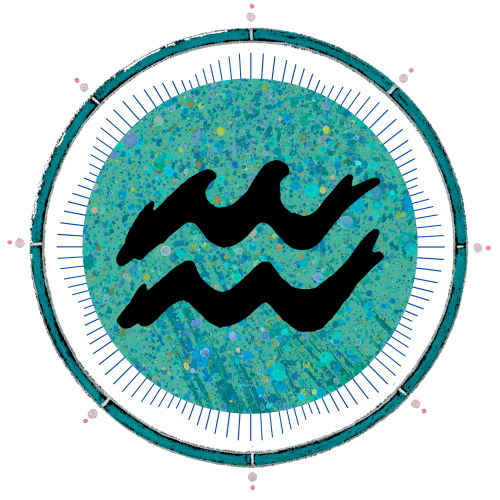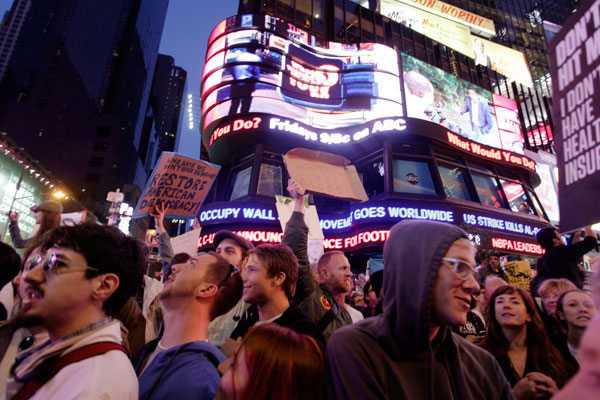
Dear Friend and Reader:
On Saturday, I went to a big rally in Times Square that was part of the Occupy Wall Street movement. Around the world in an estimated 1,500 other cities, similar protests were happening. This was one day after Mayor Michael Bloomberg wisely chose to not clear out the movement’s base camp in Zuccotti Park, in New York’s financial district. I arrived a little early, wondering what would happen. By 5 pm, the stated time of the protest, Broadway was packed from 42nd Street north up to 47th Street. A small ocean of friendly, sincere people had come out to make their presence known to the world — not to celebrate New Year’s Eve but rather to state their objection to greed.
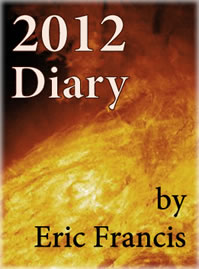 For many years, we have all watched the injustices mount against the American people. I’ve long wondered when we were going to hear an objection, and this event was something of a miracle. A decade of war, years of economic decline, jobs being shipped overseas, people with enormous college debt unable to find work — the silence was deafening and disturbing. Suddenly I was standing in Times Square, surrounded by people aware of the problem and choosing to join together as one voice. As the crowd gathered, the news ticker above ABC studios delivered the message, “Occupy Wall Street Movement Goes Worldwide.”
For many years, we have all watched the injustices mount against the American people. I’ve long wondered when we were going to hear an objection, and this event was something of a miracle. A decade of war, years of economic decline, jobs being shipped overseas, people with enormous college debt unable to find work — the silence was deafening and disturbing. Suddenly I was standing in Times Square, surrounded by people aware of the problem and choosing to join together as one voice. As the crowd gathered, the news ticker above ABC studios delivered the message, “Occupy Wall Street Movement Goes Worldwide.”
Notably, this was the first coordinated day of global action since the F-15 protests against the Iraq war on Feb. 15, 2003 — just over eight-and-a-half years ago. I’m not sure what is more amazing — that the F-15 protests happened at all, or that they didn’t continue. But they put on the record, before the fact, the public’s objection to an invasion that went horribly on every account. The current movement is happening in a different era of history, presumably for a different reason. In 2003, the economy was still riding from bubble to bubble, and objecting to a war was seen as a political statement; a statement of principle or of moral objection to what in fact became a moral outrage.
In 2011, we have another situation on our hands, one requiring neither prescience or an especially sensitive moral compass. There are millions of people for whom the economic system is not working. The real unemployment rate is closer to 20%, poverty rates are increasing, and one in five Americans is having trouble feeding their family. At the same time, people are seeing headlines over and over again about huge banks that took bailouts reaping profits, giving bonuses to top executives and laying off workers. You don’t need to be an economist to understand this is a problem.
Every day, we are told again that tax cuts for the wealthiest Americans will lead to more jobs, and after a decade of those tax cuts the economy is where it is today. The people who create these problems, making huge profits, are nervous. They know that everyone else is starting to figure out what happened, and understanding has a way of rippling out, once it gets rolling. And it is now rolling: awareness and a movement of people who are at least willing to get off the couch and step out from behind their computer and get together and discover that they are not alone.
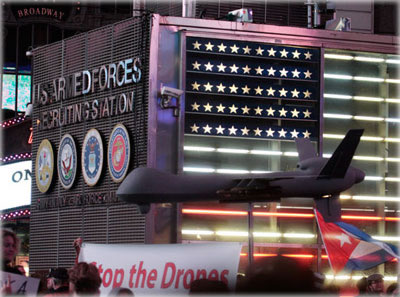
Mainstream news outlets may keep portraying Occupy Wall Street as a movement of unwashed people who have never accomplished anything and who are confused about their goals, but for the moment, at least, we can tell the story ourselves. There is now an alternative media that is so far-reaching it would have been incomprehensible 20 years ago when I was writing for In These Times and Sierra. When two dozen people get arrested at a Citibank branch for trying to close their accounts, the video goes viral within hours. That both informs many more people than would have heard the story otherwise, and puts significant pressure on the bigger news outlets to at least acknowledge what happened.
This is a very special moment we are in. When I say that we must use it wisely, I mean that we all have something precious and useful in our hands, something that many, many people recognize, however dimly, belongs to all of us.
Set Your Watch: It’s Time for Uranus Square Pluto
A few times at the protest I was asked what I do, and I said that I’m the editor of an astrology website. In answer to, “Is this in the astrology?” I said yes — it’s the Uranus-Pluto cycle. It’s the same cycle that was going off in the 1960s. I know I’ve explained this a few times. It’s not easy for everyone to understand. We are now entering an extended peak of this cycle, and at the moment we have many options for how we use this energy.
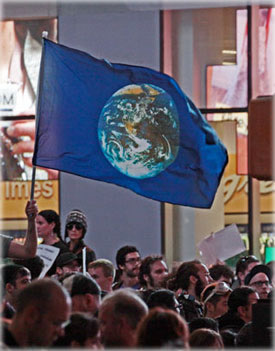
Uranus (the faster of the two planets, orbiting the Sun once in just over 84 years) has the themes of sudden upheaval, surprises, invention and forward-thinking. When Uranus gets into the picture, events proceed quickly. The best advice any astrologer can give is to expect the unexpected, and work with it rather than against it. Pluto (the slower of the two planets, taking 251 years to go around the Sun) takes anything it touches deeper. In the psyche it’s related to the drive to make contact with one’s soul, as well as profound transformations. In society, Pluto can represent control dramas as well as profound restructuring of cultural institutions: for example, the government, banks, corporations and the empire itself.
Put these two planets together and amazing things happen. Uranus and Pluto will make a big aspect every 40 to 50 years or so, which is like a shakeup of the accumulated material, outdated ideas, stuck institutions and stuck people. It’s almost always a revolutionary era.
It’s astonishing how dependable this particular cycle really is. When I say that the current movement is just getting going, and is going to last for years, I am speaking with authentic confidence that is grounded in history. Perhaps the most famous time frame associated with Uranus-Pluto is that of the French Revolution. Uranus and Pluto were opposite one another (literally, on opposite sides of the Sun) from 1787 through 1798, closely overlapping the revolutionary era of 1789 through the late 1790s. This revolution was not all fun and games. The accumulated outrage both at centuries of repression by the monarchy and the church came busting out violently. It did not end well; in many ways the opportunity was squandered. After a brief period of a constitutional republic, by late 1804 France had an emperor, in the person of Napoleon I.
Another famous period was the Uranus-Pluto conjunction of 1848-1849. This was the peak of a wide-reaching wave of change that culminated with revolutions spreading across Europe faster than the mail could travel, including Paris, Berlin, Vienna, Budapest, Dresden, Baden, Prague, Rome and Milan. Astrologer-historian Richard Tarnas describes this as “the sudden eruption of a collective revolutionary impulse affecting an entire continent with mass insurrections, the emergence of radical political and social movements, revolts for nationalist independence, and the abrupt overthrow of governments.”
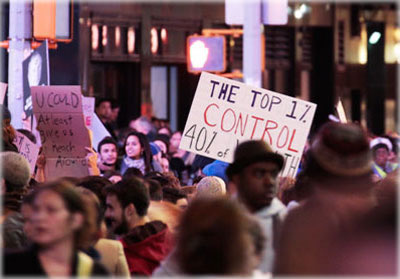
Then there was the conjunction of the 1960s, which had a similar revolutionary spirit. This was expressed in student uprisings, stunning advances in art, music and technology, the anti-war movement, the environmental movement, the Moon landing and Woodstock — to name a few events we think of that happened during a concentrated time in history. John F. Kennedy was assassinated, which was a kind of revolution, and Richard Nixon both came to power and was finally thrown out of office as the conjunction waned. That also had the feeling of a revolution, perhaps more poignantly than the JFK assassination. After a brief period of collectivism, we then embarked on a 30-year phase where politics and nearly every other facet of public life swung toward corporate power and military domination of the world.
It’s fair to say that Uranus-Pluto aspects are amazing while they last, and then the end result is a gamble. It’s easy to throw out the stodgy old jerks who were oppressing you; it’s hard to build a new world. What world we are going to build is exactly what we need to be thinking about right now. What we would do if we had the power to make changes is not just something we need to be pondering but putting into action right now.
Beyond Left and Right
One of the first things I think is essential is going beyond the usual left/right, liberal/conservative storyline. We all have human needs, and yet many people are stuck to their old tales of why things are wrong. If so-called liberals and conservatives would listen to one another, they would discover plenty of common ground — especially on economic issues, which are the core theme of these protests. This is going to be as challenging for many people as a lifelong Catholic going to Jewish services every Saturday. And certain facts (such as about the actual current distribution of wealth) are going to need to enter the picture.
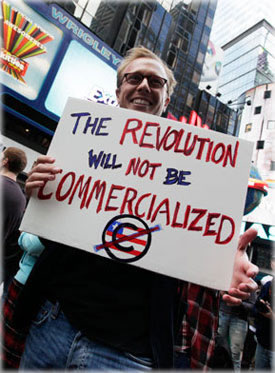
As Matt Taibbi, one of my favorite journalists, wrote Monday [Oct. 17] in his blog at Rolling Stone, “What nobody is comfortable with is a movement in which virtually the entire spectrum of middle class and poor Americans is on the same page, railing against incestuous political and financial corruption on Wall Street and in Washington. The reality is that Occupy Wall Street and the millions of middle Americans who make up the Tea Party are natural allies and should be on the same page about most of the key issues, and that’s a story our media won’t want to or know how to handle.”
Yet it’s essential that we who care unify toward some common goals. This is not easy for people who are programmed to be divisive and divided. For this to happen, I think two things are necessary. One is that the person or group with the greater understanding has to work to reach for the common ideas that underlie the problems we all agree are real. This is evolutionary work. You could say that it’s the Pluto side of the equation. Pluto represents the need for all of us to go deep and therefore reach a place where there is more likely to be mutual understanding. If we own our shadow material — our fear, guilt, anger and related emotions — we will be less likely to project those feelings onto others, and therefore less likely to blame them. There’s also something here about taking personal responsibility for that aspect of the problem that was caused by individual greed — such as the many people who used their home as an ATM, or who got their mortgage by lying about their income.
Taking this on the level of personal responsibility in order to actually do something new: to not only let go of the patterns of the past, but to create new patterns that are fundamentally different. You could say that instead of working this out as a cultural game of left versus right, we each need to get the left and right hemispheres of our brains talking to one another.
Our tendencies to divide against ourselves and hence against one another can seem intractable. They involve cultural and family patterns, emotional patterns and ideas about relationships, and I believe all these things are rooted in our DNA and what some call karma. That is to say that in addition to any revolutionary activity, for the revolution to stick, we need to do some deep healing work and understand how we got to where we needed a revolution in the first place. Fortunately there are a lot of people who have been doing that deep healing work for many years. You may be one of them. And as the revolution spills out into the streets, we will need to guide it into the hearts and souls of those who would be free.
Lovingly,
![]()



